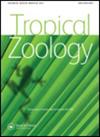蝙蝠蝇:马达加斯加特有果蝙蝠的补充营养来源
IF 0.7
4区 生物学
Q4 ZOOLOGY
引用次数: 0
摘要
在食草脊椎动物中,食用水果的营养成分通常需要补充其他食物类型,如树叶、花粉或无脊椎动物,以满足饮食要求。马达加斯加特有的果蝙蝠Rousettus madagascarensis(Pteropodidae)在梳毛活动中积极以其双翅蝇外寄生虫为食,主要是细菌科和Streblidae。由于蝙蝠苍蝇从宿主那里获取血液,蝙蝠食用这些苍蝇可能代表了一种回收和减少重要营养成分损失的机制,如矿物质或蛋白质和脂肪酸。这些体外寄生虫对马达加斯加圆线虫饮食的贡献是每日蛋白质需求的4-10%。对于一个被认为完全以食草为生的物种来说,这是一个重要的比例。本文章由计算机程序翻译,如有差异,请以英文原文为准。
Bat flies: source of supplement nutrients for an endemic Malagasy fruit bat
Among frugivorous vertebrates, the nutritional composition of consumed fruits often needs supplementing by other food types, such as leaves, pollen or invertebrates, to meet dietary requirements. The endemic Malagasy fruit bat, Rousettus madagascariensis (Pteropodidae), actively feeds on their dipteran fly ectoparasites, principally of the family Nycteribiidae and Streblidae, during grooming activities. Since bat flies take blood meals from their hosts, the consumption of these flies by bats might represent a mechanism of recycling and reducing the loss of important nutritional components, such as minerals or proteins and fatty acids. The contribution of these ectoparasites to the diet of R. madagascariensis is 4–10% of the daily protein requirements. This is an important proportion for a species considered to be exclusively frugivorous.
求助全文
通过发布文献求助,成功后即可免费获取论文全文。
去求助
来源期刊

Tropical Zoology
生物-动物学
CiteScore
2.50
自引率
0.00%
发文量
1
审稿时长
>12 weeks
期刊介绍:
Tropical Zoology is an international zoological journal publishing original papers in the field of systematics, biogeography, phylogeny, ecology and conservation of all terrestrial and aquatic animal Phyla from tropical and subtropical areas.
Only papers with new information, high quality and broad interest are considered. Single species description and checklists are not normally accepted. Review papers are welcome. The journal is owned by the Istituto di Ricerca sugli Ecosistemi Terrestri of the Consiglio Nazionale delle Ricerche, Florence, Italy (CNR-IRET) who performs research into the structure and functioning of aquatic and terrestrial ecosystems, focusing in particular on anthropogenic pressure and global change. The knowledge amassed forms the scientific basis for identifying the most appropriate protective and corrective interventions, and provides support for the bodies entrusted with formulating policies for environmental protection and recovery.
 求助内容:
求助内容: 应助结果提醒方式:
应助结果提醒方式:


